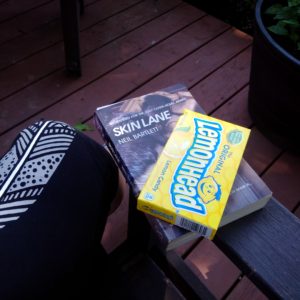This is how I set myself up for a perfect afternoon. Yoga pants all day, candy, several cups of tea and weather that barely broke 85°, after several weeks of near triple digits. Life is good.

Skin Lane, by Neil Bartlett came highly recommended, so I bought myself a physical copy. (I don’t think it’s even available in e-format.)
Description from Goodreads:
At forty-seven, Mr. F’s working life on London’s Skin Lane is one governed by calm, precision, and routine. So when he starts to have recurring nightmares, he does his best to ignore them. The images that appear in his dreams are disturbing—Mr. F can’t think of where they have come from. After all, he’s an ordinary middle-aged man.
As London’s backstreets begin to swelter in the long, hot summer of 1967, Mr. F’s nightmares become an obsession. A chance encounter adds a face to the body that nightly haunts him, and the torments of his restless nights lead him—and the reader—deeper into a terrifying labyrinth of rage, desire, and shame.
Review:
I don’t think I can manage a real review of this. The best I can manage is a rambling wordgasim. There were passages in this book that left me so shattered that all I could do was read and re-read them, occasionally searching places to share. Like this part on page 46:
By the time he was what would now be called a teenager, his father, never quite sure what a widower was meant to do with children anyway, had taken to spending every evening alone in the front room with the evening paper; this meant that although by the age of sixteen Mr. F knew how to contribute a week’s wages to the household budget, how to scrub and bleach and to cook, no one had ever taught him how to feel. Indeed, the only real lesson his father taught him was that feelings should never be spoken of; his dead mother, for instance, was never mentioned, and there were no pictures of her in the house. When the younger of his brothers was killed, it was Mr. F who went to the door to get the telegram, and when he had given it to his father to read, the old man (men were old at fifty in those days) had done nothing but sit, stony-faced in his usual arm-chair, never saying a word, waiting until night had fallen and the house was dark before walking slowly upstairs, closing his bedroom door behind him, and shouting out his lonely, foul-mouthed, broken-hearted grief to the empty bed on which his children had been conceived. That night, Mr. F again found himself sitting on the stairs, with his head on one side, wondering what the noises meant. Wondering why the door had to be closed before they could be spoken.
It’s a little long for sharing, but I was so effected by it that I tried posting it on Goodreads. When it didn’t fit and I couldn’t bring myself to prune it, I read it to my husband and posted it on my personal Facebook page instead. I needed someone to share the experience with me before I could move on. This pattern of mundane, mundane, mundane, emotional gut-punch was one that Bartlett used to great effect on several occasions and it never failed to enrapture me.
The use of language and pacing to elicit feelings was sublime. I didn’t even mind that the pace was slow and the story really a little on the depressing or melancholy side. The luscious prose made up for any small detractions I could find. Made up for the fact that Beauty was a little shit, of course he was. He’s a pampered 16-year-old boy, unable to grasp the gravity of the situation he founds himself in; practically unaware of it really. Made up for Mr. F’s occasionally un-relatable lack of emotions, which let’s be fair, was instrumental to his character.
Honestly, I have nothing constructive to say. Go read it. There were moments I didn’t like in the book, but by the last page all I could do was curl the book into my chest and hug it to myself. It will go on my to-keep shelf. It should probably go on yours too.
